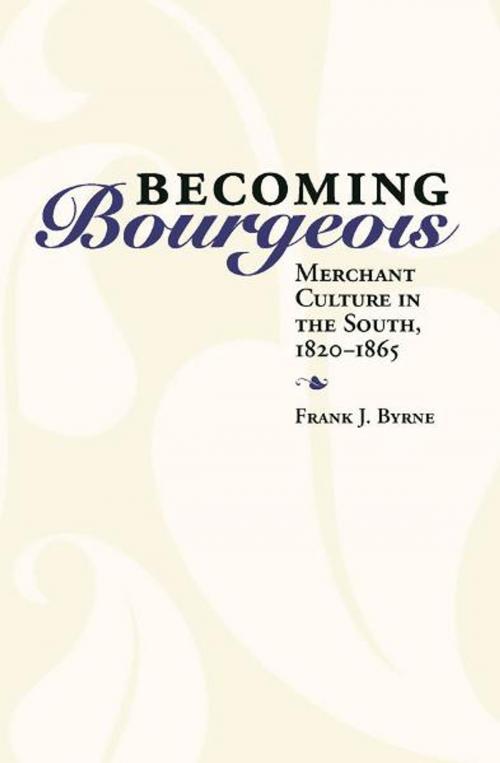Becoming Bourgeois
Merchant Culture in the South, 1820-1865
Business & Finance, Economics, Economic History, Nonfiction, History, Americas, United States| Author: | Frank J. Byrne | ISBN: | 9780813138169 |
| Publisher: | The University Press of Kentucky | Publication: | October 20, 2006 |
| Imprint: | The University Press of Kentucky | Language: | English |
| Author: | Frank J. Byrne |
| ISBN: | 9780813138169 |
| Publisher: | The University Press of Kentucky |
| Publication: | October 20, 2006 |
| Imprint: | The University Press of Kentucky |
| Language: | English |
Becoming Bourgeois is the first study to focus on what historians have come to call the "middling sort," the group falling between the mass of yeoman farmers and the planter class that dominated the political economy of the antebellum South. Historian Frank J. Byrne investigates the experiences of urban merchants, village storekeepers, small-scale manufacturers, and their families, as well as the contributions made by this merchant class to the South's economy, culture, and politics in the decades before, and the years of, the Civil War. These merchant families embraced the South but were not of the South. At a time when Southerners rarely traveled far from their homes, merchants annually ventured forth on buying junkets to northern cities. Whereas the majority of Southerners enjoyed only limited formal instruction, merchant families often achieved a level of education rivaled only by the upper class -- planters.
The southern merchant community also promoted the kind of aggressive business practices that New South proponents would claim as their own in the Reconstruction era and beyond. Along with discussion of these modern approaches to liberal capitalism, Byrne also reveals the peculiar strains of conservative thought that permeated the culture of southern merchants. While maintaining close commercial ties to the North, southern merchants embraced the religious and racial mores of the South. Though they did not rely directly upon slavery for their success, antebellum merchants functioned well within the slave-labor system. When the Civil War erupted, southern merchants simultaneously joined Confederate ranks and prepared to capitalize on the war's business opportunities, regardless of the outcome of the conflict.
Throughout Becoming Bourgeois, Byrne highlights the tension between these competing elements of southern merchant culture. By exploring the values and pursuits of this emerging class, Byrne not only offers new insight into southern history but also deepens our understanding of the mutable ties between regional identity and the marketplace in nineteenth-century America.
Becoming Bourgeois is the first study to focus on what historians have come to call the "middling sort," the group falling between the mass of yeoman farmers and the planter class that dominated the political economy of the antebellum South. Historian Frank J. Byrne investigates the experiences of urban merchants, village storekeepers, small-scale manufacturers, and their families, as well as the contributions made by this merchant class to the South's economy, culture, and politics in the decades before, and the years of, the Civil War. These merchant families embraced the South but were not of the South. At a time when Southerners rarely traveled far from their homes, merchants annually ventured forth on buying junkets to northern cities. Whereas the majority of Southerners enjoyed only limited formal instruction, merchant families often achieved a level of education rivaled only by the upper class -- planters.
The southern merchant community also promoted the kind of aggressive business practices that New South proponents would claim as their own in the Reconstruction era and beyond. Along with discussion of these modern approaches to liberal capitalism, Byrne also reveals the peculiar strains of conservative thought that permeated the culture of southern merchants. While maintaining close commercial ties to the North, southern merchants embraced the religious and racial mores of the South. Though they did not rely directly upon slavery for their success, antebellum merchants functioned well within the slave-labor system. When the Civil War erupted, southern merchants simultaneously joined Confederate ranks and prepared to capitalize on the war's business opportunities, regardless of the outcome of the conflict.
Throughout Becoming Bourgeois, Byrne highlights the tension between these competing elements of southern merchant culture. By exploring the values and pursuits of this emerging class, Byrne not only offers new insight into southern history but also deepens our understanding of the mutable ties between regional identity and the marketplace in nineteenth-century America.















